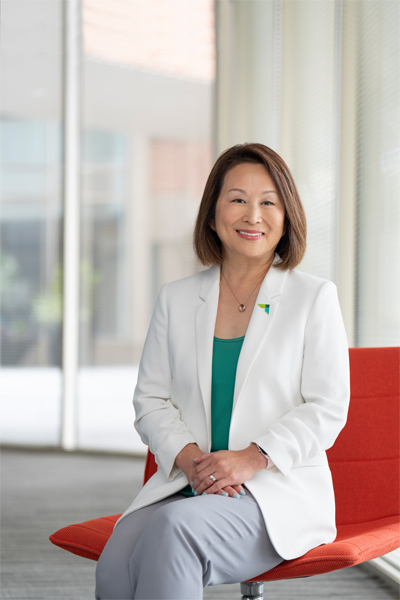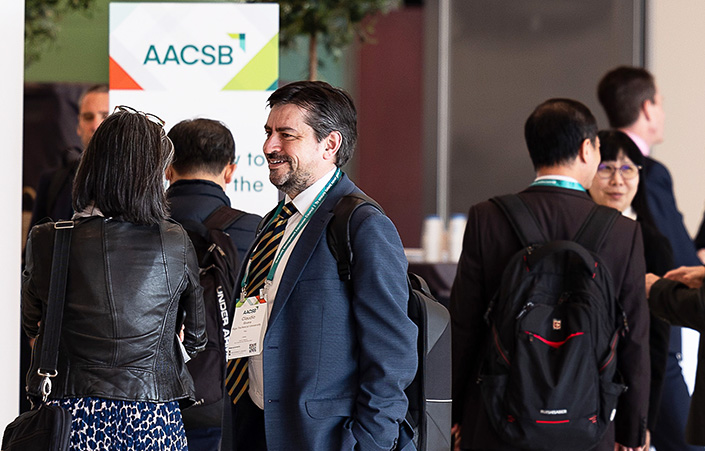'Eyes on the Sky, Feet on the Ground'
- AACSB’s CEO Lily Bi, who holds an MBA and a DBA, points to education as a major driver of her career and leadership development.
- AACSB’s biggest challenge, she believes, is to understand the dynamic needs of business schools in this disruptive age and to find ways to advance business education in making positive impacts.
- Over the next 10 years, Bi believes the greatest mission for business education will be to shape students’ futures and enable public good.
Any industry, organization, or individual that wants to succeed and grow must possess two qualities—an ambitious vision and a pragmatic plan for achieving that vision. Lily Bi brings both qualities to AACSB International as its new president and CEO. In June, Bi succeeded Caryn Beck-Dudley, who retired as AACSB’s leader in May after leading the organization for three years.
Over her 30-year career, Bi has led technological innovation and shaped strategic direction in both businesses and associations. She began her corporate career as vice president of IT for Mizuho Corporate Bank in Singapore. Most recently, she served as the executive vice president of global standards and certifications at the Institute of Internal Auditors (IIA), where she helped set the global internal audit standards, drive global research, and provide strategic direction for the institute’s global certifications. She also served as executive director of the Internal Audit Foundation.
Bi notes that the three phases of her career—which have spanned information technology, auditing, and association management—intersect with business education. She also sees similarities between IIA and AACSB, because both are global associations that shape and set standards for their industries, promote continuous improvement, provide member services, and offer opportunities for learning and development. “I feel prepared to work with each of AACSB’s audiences—to work with business and business schools and to advance business education,” she says.
As a certified internal auditor, Bi also has prioritized her own education. She holds an MBA from the University of Texas at Dallas, as well as a Doctor of Business Administration (DBA) from the University of South Florida in Tampa. She has worked in four different countries, including China, Japan, Singapore, and the United States. Bi’s global experience has deepened her appreciation of cultural diversity. With the increasing interconnectedness of the global economy, she says, global and cross-cultural competence has been “a major asset” during her life and career.
Bi is excited by AACSB’s role in driving engagement, innovation, and impact in global business education through its accreditation standards, learning and development opportunities, member services, and thought leadership. Bi believes that the purpose of industry standards is to help each member organization continuously improve in quality and elevate the industry as a whole. That same spirit, she says, will inspire her leadership at AACSB and advance the association’s vision to transform business education globally for positive societal impact.
Below, Bi introduces herself to AACSB’s membership. She talks more about her career, her leadership philosophy, and the activity that brings her the greatest joy.
Could you share an early experience that shaped your career?
After working for 13 years as an IT engineer in China, Japan, and Singapore, I decided to open my career perspective by going back to business school. So, I came to the United States to get my MBA degree. That was a very key milestone for the later part of my career.
The business school imbued a fantastic and solid foundation for me to advance my career, and to serve society as a whole. After I graduated with my MBA, I began working in management—first in auditing, and then in the association realm. Another 13 years passed, and, as a lifelong learner with strong intellectual curiosity, I desired to get a terminal degree. Once again, I went back to business school and completed a doctorate in business administration. From technology to business education—those transitions helped me in my career development and in my personal growth.
What inspires you most as a leader?
What inspires me is to think deeply and to think ahead, to have a clear vision and purpose, and to make positive impacts. At AACSB, we are currently creating an organizationwide strategic plan. I enjoy that we set goals and get things done.
 |
|
Lily Bi, CEO of AACSB International |
What challenges does business education currently face, and what do you think AACSB’s role should be in offering solutions?
Regardless of where they are in the world, business schools face challenges from rapid technological advancements. Business education needs to keep pace with these advancements to ensure students are prepared for digital disruption. AACSB encourages member institutions to integrate technology and digital literacy into their curricula. It is essential for them to incorporate emerging technologies and data-driven decision-making skills across business disciplines.
In a recent AACSB global membership survey, many schools shared challenges related to societal impact, the student pipeline, and faculty quality. AACSB is here to help all business schools through its accreditation, membership services, thought leadership papers, training, and conferences. We want to make sure that business schools can connect with each other to share best practices and interact with the business world.
What do you anticipate being your biggest challenge as you take the lead at AACSB?
Business schools worldwide are at various maturity levels; each has adopted different governance, funding, and educational models and delivers courses in a different way. So, I think that the biggest challenge for me, and for the organization as a whole, is determining how to truly understand the needs of various business schools and find ways to serve those needs.
I am going to personally listen to many business schools in various regions so that we can develop a new global strategic plan and truly advance business education.
The first two A’s in AACSB’s name stand for “Association to Advance.” AACSB is determined to advance business education globally. How can we work with each business school, and with the business community, to advance business education? That’s our overarching challenge. We have started the strategic planning phase, and I am going to personally listen to many business schools in various regions so that we can develop a new global strategic plan and truly advance business education.
What do you think are some of AACSB’s greatest strengths as an organization?
I think AACSB’s biggest strength is its global network of businesses and business schools. We have close to 2,000 organizational members. All of our educational members are committed to providing high-quality business education to shape the future generation of leaders. Within those, more than 1,000 business schools have received our accreditation, and 194 accounting programs have received our accounting accreditation.
AACSB has built such a well-established and positive brand reputation in the last 100-plus years. That is our asset. Our job is to ensure its continuous growth and vibrant future.
What are some of its other advantages?
We have effective leadership and governance, and our board of directors is very committed to serving members and quality business education globally. We also have talented staff members, who are ready and passionate to provide member services and to improve business education. AACSB has a wide geographic reach. Our member institutions reside in over 100 countries worldwide, and our accredited schools deliver the highest level of business education in 62 countries.
What trends in business do you think will most impact business education in the near future?
We live in an era of change. Business is shifting faster than we can imagine. This means new, evolving challenges for business education.
The first major challenge is how business schools grapple with technology. All of us have seen the change brought about by artificial intelligence and ChatGPT. Technology has been a fundamental element in all business areas. The acceleration of technological change is going to be exponential compared to what it was in the past decade. Business schools must find the best ways to prepare students to navigate technological challenges.
The second major challenge is how each business school serves the public good. Businesses are held accountable for their impact on the environment and society. Business schools need to incorporate sustainability and social responsibility into their programs.
Cross-cultural competence is often a critical skill that individuals often need to become business leaders. As businesses continue to operate in a globalized world, I would expect business education to emphasize cross-cultural awareness, international business practices, and the ability to navigate diverse cultural contexts.
What advice would you give to recent graduates who are just entering the workforce?
I would suggest that they put their eyes on the sky and their feet on the ground. By “eyes on the sky,” I mean that every graduate has great ambitions, wants to have their dreams come true. They want to change the world.
But at the same time, they’ve got to keep their feet on the ground—they have to do the daily work. Sometimes that work can be tedious, sometimes it can be boring. But if they do their work well, they will make a world of difference. Every success comes from small steps.
What advice would you give to incoming college students about why they might want to consider earning business degrees?
Business education covers fundamental knowledge and skills that everybody needs, whether one works for a public company, a private company, or a government entity. At business school, we teach accounting, we teach finance, we teach economics, we teach technology, marketing, etc. Students can develop versatile skill sets that are applicable across various industries. Skills such as critical thinking, problem-solving, communication, leadership, and quantitative analysis are highly transferable and valuable in a wide range of professional settings.
A business degree opens doors to a diverse array of career paths. You can tailor your degree to match your interests and strengths.
In the next 10 years, I am hoping that business schools will become enablers for the public good. They need to equip students with the ability to think about serving the public interest while serving the company.
What is your vision for the future of business education?
The purpose of business education has always been to prepare the leaders of tomorrow. Its mission needs to also include shaping society’s future. In the next 10 years, I am hoping that business schools will become enablers for the public good. They need to equip students not only with the knowledge and skills to run a business, but also with the ability to think about serving the public interest while serving the company.
What brings you joy in life?
Travel and seeing the world. So far, my husband and I have visited more than 70 countries. Every time we travel to a different country, we enjoy the new cultures and appreciate the different cuisines and ways of life. Traveling gives me a sense of global citizenship and a recognition of our interconnectedness.
Of course, it often takes me out of my comfort zone, but I learn from unfamiliar situations. Global travel offers enriching experiences that will stay with me long after I return home. Lastly, I want to say that the world is full of diverse cultures, values, and views, but it is a beautiful place because we are all different.





